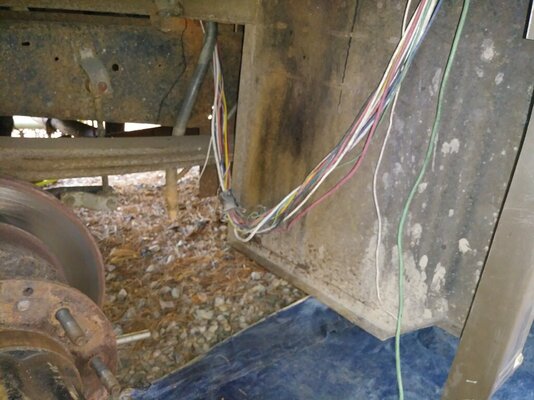My 19 foot camper has a single axle, and I assumed that it was adequate when I bought this travel trailer. For a few years I had no problems, but two years ago I suffered a tire blowout that did a moderate amount of additional body damage to the camper. We had the repairs done, and replaced all three of the tires including the spare thinking that the original tires may have contributed to the problem. All was well until our most recent trip. This was only the second trip since getting the new tires two years ago and I never expected tire problems. But on a totally rural Colorado road, with no cell service, we suffered a blowout. Thankfully two good Samaritans stopped to help, and had the tools and know-how to help me. The blown tire had ripped much of the undercarriage wiring out as well as damaged outside body panels and other parts of the bottom on the camper. After putting the spare on for us, we were able to limp to the campground where we had a reservation. There a very helpful mobile RV repairman helped us out, replacing the tire and rim that had blown, and checking the opposite tire as well. The camper was no longer functional without the wiring needed for things like the refrigerator, hot water heater, most of the interior lights and the a/c but at least we had tail lights working as well as the electric brakes. We started home with the idea of staying in motels and keeping our speed down to 55, hoping just to get home in one piece. And of course that was not to happen.
Partly home, with about 400 miles to go, the opposite side tire blew out. Fortunately this involved just the tire itself and a bit of body paneling on that side of the camper, and with the help of a local tow service the tire was changed. We made it home without a spare tire, fearing yet another blowout along the way. All of the tires involved in this nightmare were apparently in good shape, properly inflated and mounted. I can't help but feel that part of the issue at least is the design of the camper with a single axle supporting all of the weight and stress. My plan is to have all of the repairs done, and then to try to sell this camper and move on. Anything I buy in the future will either be a motor home of some type or a travel trailer with at least a double axle.
Partly home, with about 400 miles to go, the opposite side tire blew out. Fortunately this involved just the tire itself and a bit of body paneling on that side of the camper, and with the help of a local tow service the tire was changed. We made it home without a spare tire, fearing yet another blowout along the way. All of the tires involved in this nightmare were apparently in good shape, properly inflated and mounted. I can't help but feel that part of the issue at least is the design of the camper with a single axle supporting all of the weight and stress. My plan is to have all of the repairs done, and then to try to sell this camper and move on. Anything I buy in the future will either be a motor home of some type or a travel trailer with at least a double axle.

